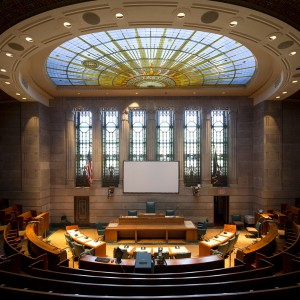19 Aug Legislative Prayer and Local Governments: Do You Begin Every Meeting by Violating the Constitution?
If your community starts its government meetings with a prayer, it might be violating the Constitution.
In a case that the Supreme Court will consider in the coming term, Town of Greece v. Galloway, 12-696, the Court will decide whether a local government’s legislative prayer practice runs afoul of the Establishment Clause.
The Second Circuit held that the Town of Greece’s prayer practice is unconstitutional because “an objective, reasonable person would believe [it] had the effect of affiliating the town with Christianity.”
The court found that even though the Town randomly selected its prayer givers:
- “Christian clergy delivered each and every one of the prayers for the first nine years of the town’s prayer practice, and nearly all of the prayers thereafter”;
- “[M]ost of the prayers at issue . . . contained uniquely Christian references”;
- “[T]he town did not explain that it intended the prayers to solemnize Board meetings, rather than to affiliate the town with any particular creed”; and
- “[M]ost prayer-givers appeared to speak on behalf of the town and its residents, rather than only on behalf of themselves.”
The case requires the Supreme Court to re-visit its Establishment Clause precedents.
In Marsh v. Chambers, 463 U.S. 783 (1983), the Court appeared to broadly endorse legislative prayer—even where a single Presbyterian minister delivered every prayer for 16 years. The Court did so primarily on historical grounds. It did not apply the test in Lemon v. Kurtzman, 403 U.S. 602 (1971), which uses a form of an “endorsement test” to look in part to a practice’s effect on a reasonable observer.
But six years after Marsh, the Court decided Allegheny County v. Greater Pittsburgh ACLU, 492 U.S. 573 (1989), in which it ruled that placing a crèche on a courthouse violated the Establishment Clause. The Court distinguished Marsh by stating that it turned on the fact that the chaplain had “removed all references to Christ” from his prayers. How Allegheny County fits with Marsh may be important.
The Town suggests that the lower courts are now split into two camps. In one are courts that assess whether the government, in adopting the practice, impermissibly sought to affiliate with a particular religion (as the Ninth Circuit does). In the other are courts that look beyond the government’s motive and evaluate a practice’s practical effect on observers (as the Second and Fourth Circuits do). Some have speculated that the Court may use the case to transform the “endorsement test” into a test under which it will be harder to bring a successful Establishment Clause challenge.
Practical questions the Court might address include:
- Is any legislative prayer permissible? and
- If it is, must a local government screen the prayer or the prayer givers? Or is that editorial role itself problematic?
For an in-depth discussion of the case, check your May/June 2013 issue of The Municipal Lawyer Magazine.




